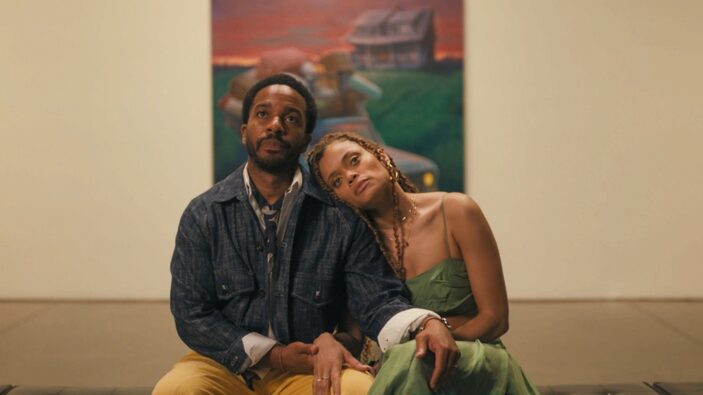
The complexities of forgiveness and accountability against a familial backdrop laced with tension, regret and one’s own personal demons, Exhibiting Forgiveness is a thought-provoking drama, and one that bides its time in surrendering to its emotional explosiveness.
Written and directed by Titus Kaphar, marking his feature debut, Exhibiting Forgiveness focuses on Tarell Rodin (André Holland), a renowned artist known for his deeply personal, oft-haunting work. He’s a man battling his own inner turmoil, so much so that they are manifesting in vivid nightmares that continually wake him up in a near-fatal manner. His devotion to his art and his loving family – Andra Day delivers beautiful, understated work as his singer-songwriter wife, Aisha – has helped him keep his past contained, but only so much can stay at a distance for so long, and an unknown action from his mother, Joyce (Aunjanue Ellis-Taylor), brings a certain boil to the surface.
Wanting to take care of Joyce and move her out her neighbourhood, she displays an odd apprehension, claiming she wants to stay close to her church, but she has a bigger plan in bringing her family back together, arranging an unwanted reunion between Tarell and his since-absent father, La’Ron (John Earl Jelks). Suffering through an abusive childhood – we see moments of the torture a young Tarell endured – as a grown man, Tarell wants no part of the supposedly reformed La’Ron’s presence in his life, but the love for his mother forces him to manage such emotions.
I can’t speak to how men of colour are taught to express (or repress) their feelings, but, in general, it would seem men are so often expected to almost be unfeeling, void of emotion (at least publicly) and to work through their grief in a more practical manner. The gaze of “toxic masculinity” is constantly being confronted and debunked, and Exhibiting Forgiveness furthers such as it presents an emotionally rounded figure in Tarell, a man who isn’t afraid to say or show what he’s feeling, and refuses to take La’Ron’s reformation at face value.
Though the film does suggest an air of closure for Tarell, or at least a reprieve, there isn’t a great deal of levity present. As viewers we are tasked with experiencing Tarell’s trauma, and without much of a space to breathe it can become an overwhelming experience, and one that may not sit well with all. Ultimately, Exhibiting Forgiveness isn’t asking for, well, forgiveness in how it wants to process Tarell’s story, nor how others choose to forgive themselves in spite of their past transgressions. Kaphar has taken a realistic, some may even say harsh, approach to the act of healing, and whilst the film may not always be a pleasant experience, it’ll resonate with anyone who has been hurt, whether it’s emotional or physical.
![]()
![]()
![]()
![]()
![]()
THREE AND A HALF STARS (OUT OF FIVE)
Exhibiting Forgiveness is playing as part of this year’s Sundance Film Festival, taking place in-person (and select virtually) between January 18th and 28th, 2024, For more information head to the official Sundance page.
